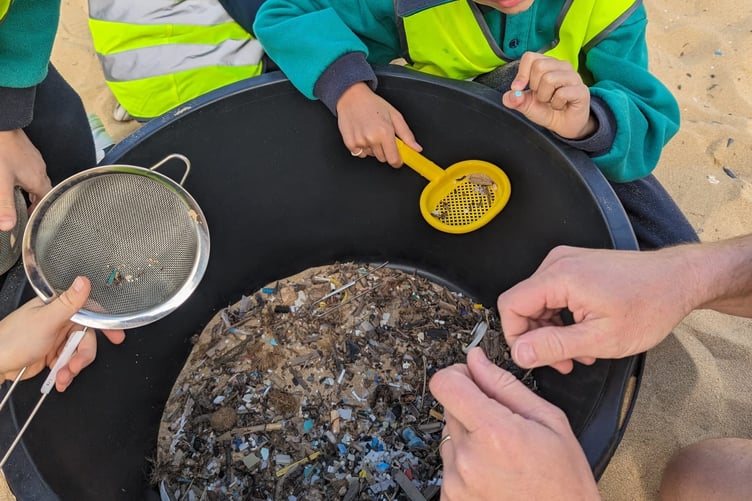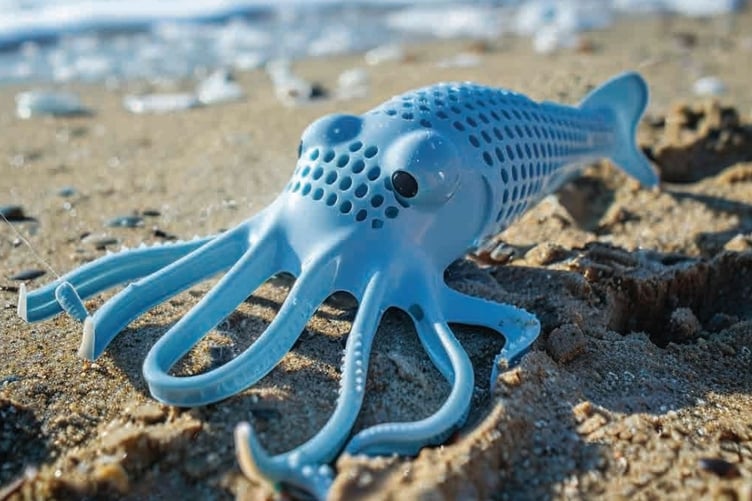When it comes to conservation it can be overwhelming to decide where to allocate our limited time and energy. However, children possess a unique superpower when it comes to tackling complex problems: their enthusiasm, energy and optimism.
These qualities are invaluable in the fight against plastic pollution.
Empowering children to address real-world issues is crucial. By making solutions accessible and understandable, we can instill principles such as environmental stewardship, data gathering, prevention, and the circular economy from an early age. This foundation will give young people a head start in a rapidly changing business landscape where ESG (Environmental, Social, and Governance) is becoming essential for all businesses.
In a world where plastic pollution threatens our oceans and marine life, one company is harnessing the power of youth to make a difference. Meet Odyssey Innovation, a trailblazing organisation that has been at the forefront of circular economy solutions for marine plastics for the past decade.
Founder and visionary behind Odyssey Innovation, Rob Thompson, embarked on this mission ten years ago. His pioneering work has not only gained global recognition but has also resulted in the recycling of hundreds of thousands of kilos of marine waste. But this isn't just about numbers; it's about impact.
Marine plastic pollution presents multifaceted challenges, and Odyssey Innovation understands that there's no one-size-fits-all solution. Their approach involves collaboration, out-of-the-box thinking, and a commitment to creating products that tell a story. The first of these products? Kayaks made from marine plastic.

These kayaks became more than vessels; they were tools for change. Through their "Paddle for Plastic" campaigns, Odyssey Innovation enabled NGOs and individuals to recover marine plastic from otherwise inaccessible stretches of coastline. But the journey didn't end there. The company continued to innovate, developing a range of products that bridge the gap between waste and resource.
Now, Rob has set his sights on a new challenge: engaging younger generations in the fight against marine plastics through empowering young minds, strengthening the connection between waste and resource, and creating products that are not only impactful but also fun. Because when it comes to ocean plastic, engagement matters. By making it relevant to people's recreation and enjoyment, you start to cultivate a culture where many individuals are making small changes which have a large cumulative impact.
As a father of two (soon to be three), he knows the importance of instilling environmental consciousness early on. But how do you make a complex issue like plastic pollution relevant and exciting for kids? The answer lies in creating products specifically designed for them. Initially, beach toys seemed like an obvious choice, but Rob wanted to avoid inadvertently adding to the problem. Cheaply produced beach toys often break or the smaller elements get lost and end up as marine plastic, defeating the purpose.
Instead, he envisioned a different kind of beach toy—one that would empower young people while cleaning up our shores. And so, the idea of a "toy beach clean tool" was born which would work on the principle of “Many Hands Make Light Work”.
In March 2024, Odyssey Innovation partnered with a School for a beach clean. While large plastic pieces were scarce, they targeted microplastics—the tiny plastic fragments that infiltrate every corner of our planet. For three years Rob worked with Plymouth University who are at the forefront of microplastics research. He learnt how the impacts of microplastics are not yet fully understood, but they are being found everywhere, from our beaches to the highest mountain peaks, and even in the deepest parts of our oceans. They've infiltrated our food, water, air and even our children's blood streams.

During the beach clean, Rob noted that the tools they were using were either too cumbersome or too flimsy. The large builder's sieves were unwieldy for young people, while the toy sieves were too small and fragile. It was during this event that the idea for Scuttle the Cuttle was born—a groundbreaking tool designed to engage young beachgoers in cleaning up microplastics from our shores.
Scuttle the Cuttle combines the functionality of a bucket, scoop and a sieve into a single, innovative design shaped like a cuttlefish. It's unlike any other product on the market and crafted entirely from recycled ocean plastic. Scuttle is designed as a single piece, eliminating small parts that could get lost in the sand. Its durable design ensures it can withstand the wear and tear of beach cleaning activities. Eventually, when Scuttle reaches the end of its life, it can be fully recycled back into other products.

The beach clean was attended by approximately 100 seven- to eight-year-old children. Their enthusiasm and understanding of the importance of removing microplastics was clear to see and in just a small part of the beach they managed to recover several thousand plastic fragments. Scuttle the Cuttle aims to continue this valuable work by engaging more young people (and those young at heart) in actively in cleaning up microplastic. By combining practical functionality with an appealing design, they hope to help inspire the next generation of environmental stewards.
The development of the Scuttle is being supported by the Cornwall & Isles of Scilly Growth Hub and The University of Plymouth STRIDE Program. Now, they seek your support! Cast your vote for them by the June 2 as a Biffa Change Maker to scale up manufacturing and make this tool accessible to everyone. It's as simple as clicking two buttons—no personal information required. Follow this link to cast your vote.




